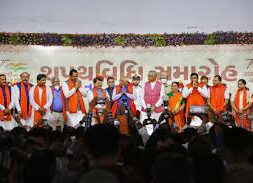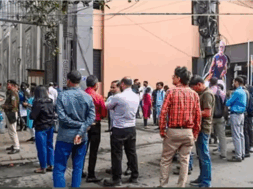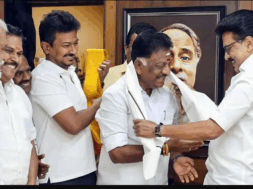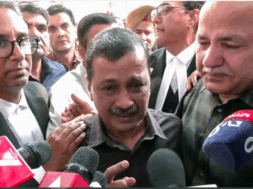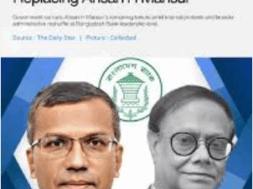
Manas Dasgupta
GANDHINAGAR, Sept 16: Sending a shock message to the BJP governments in other states, the prime minister Narendra Modi and his right-hand man home minister Amit Shah enforced a “no repeat policy” in constituting the new cabinet in their home state of Gujarat packing home back every minister that served in the unceremoniously ousted Vijay Rupani cabinet.
The swearing-in ceremony of the new cabinet, which had to be postponed by a day following the near-revolt like situation among the senior leaders of the party, was held at the Raj-Bhavan on Thursday where the governor Acharya Devvrat administered the oath of office and secrecy to 10 cabinet and 14 ministers of state, including five ministers of state with independent charge, with the newly-inducted chief minister Bhupendra Patel, also a first time MLA, and his predecessor Rupani looking on.
The brand new cabinet many of whom do not have the experience of even running a municipality or a municipal corporation, apparently sends a message across that political convenience and caste factor rather than the competence to run an administration was the most essential quality to become a minister in the BJP dispensation.
The swearing-in of the new cabinet was originally scheduled to be held on Wednesday afternoon and all preparations at the Raj-Bhavan for conducting the ceremony was completed before it was pushed back by a day to discipline the angry senior leaders who had threatened to revolt.
The flurry of activities started after oral messages were sent to all the ministers on Tuesday night to vacate their respective offices in the state secretariat giving credence to the earlier rumours that the new chief minister, who was installed in the office on Monday, had been instructed to drop the entire Rupani cabinet and bring new faces, preferably from the young cadre.
The senior leaders who saw their future at stake, including the six Congress turncoats who had joined the BJP only on the lure of being given a ministerial berth two years back, made a bee-line to the party office and other senior leaders for re-inclusion in the new cabinet. They were reportedly told to take Rupani as the model since he had submitted his resignation without raising any question on the leaadership’s decision.
The senior leaders were forced to give their consent that they would abide by the decision of the party high command and co-operate with the new government and accept any responsibility given in the organization and start preparations for the state Assembly elections due in November-December, next year. The new list of ministers was prepared overnight and approved by Modi and Amit Shah before they were informed about their new role in the state.
The brand new cabinet took oath – over-riding protests by former ministers who had to step down along with former Chief Minister Vijay Rupani last week. The outcome was inevitable, as a senior leader of the party explained, “Even the top leaders will have to accept whatever the leadership says because of the stature of Narendra Modi and Amit Shah and no politician, especially in the BJP in Gujarat, can openly challenge the calls they take.” Sources had indicated that the dissidents who wanted to be part of the new cabinet — including Rupani’s deputy Nitin Patel — will have to capitulate, given the backing for this hard reboot.
The Assembly Speaker Rajendra Trivedi — who stepped down from the post earlier in the day, and former state BJP president Jitu Vaghani were part of the new ministry.
The change of guard in Gujarat was apparently made necessary by Rupani’s alleged inept handling of the second wave of Covid earlier this year, with multiple hospital deaths due to lack of oxygen being reported. Prime Minister Narendra Modi, sources said, had pushed for the change in view of the coming elections, in which the BJP is hoping for a seventh consecutive term.
The Congress took a swipe at the BJP’s ‘no repeat’ policy, with a senior party leader tweeting, “Gujarat BJP has adopted ‘No repeat’ policy, because they know people of Gujarat have made up their mind to adopt “No repeat” policy in 2022 elections.”
Out of total 25 members including the Chief Minister, only very few members have previous ministerial experience that included Rajendra Trivedi, who was a Minister in the Anandiben government, Kiritsinh Rana, who served in the government of Narendra Modi, and Raghavji Patel, who had served in the Shankarsinh Vaghela government in the mid-90s and is one of the Congress turncoats. Moreover, many of them are first-time legislators, including the chief minister himself, who have been tasked with ministerial responsibilities in the new administration just 15 months ahead of the crucial Assembly election.
